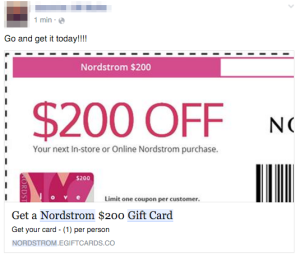
Fake Nordstrom Gift card offer
Users of Facebook and other social media sites have been sharing various versions of a fake Nordstrom gift card offer. The ad claims that Nordstrom was offering a $200 gift card to Facebook users who “referred three friends” to the promotion. Its a scam.
Social media users encouraged to click on the ad that takes the victim to a fake Nordstrom website that uses a web address variation on nordstrom.egiftcards.co. Here’s a tip; web users need to be aware that duplicate websites that actually belongs to cyber criminals are a common tactic. These websites are often perfectly counterfeited.
Instructions in the ad are as follows;
To Celebrate Valentines Day Get a Nordstrom $200 Gift Card
Simply Invite 3 Friends to Get Your Gift Card
After 3 Friends Click Your Link.
Get Your Gift Card Instantly!
Although the fake webpage in question doesn’t look like other popular Facebook coupon scams it did display a rapidly decreasing number of “available gift cards.” Here’s another tip; cyber criminals often use tactics that increase urgency in the victim. Making you believe that you may lose out on a good deal causes you to act quickly.
Facebook is a hotbed for coupon and gift card scams. Popular retailers impersonated on the social media website include Kohl’s, Costco, Home Depot, Lowe’s, Kroger, Best Buy, Macy’s, Olive Garden, Publix, Target, Wegmans, and Walmart.
Nordstrom is aware of the scam and offered this statement; “You’re correct, this is a fraudulent promotion as it is not affiliated with Nordstrom and we are not sponsoring any giveaways of gift cards. We recommend not clicking the link or entering any personal information. Our team is actively working to make customers aware of the situation and apologize for any confusion.”
In 2014 the Better Business Bureau published an article advising social media users on how to avoid survey and coupon scams. The BBB warns;
- Your eyes will deceive you. Cyber criminals know how to impersonate websites perfectly. Scammers can also make links look like they lead to legitimate websites and emails appear to come from a different sender. This is called spoofing. Use your cursor and hover over links and carefully examine the address that pops up. These are often very clever. www.nordstrom.com is easily confused with www.nordstrom.ru.
- Legitimate businesses do not ask for credit card numbers or banking information on customer surveys. If they do ask for personal information, like an address or email, be sure to carefully examine privacy policy. Do not provide anyone else’s email or personal information. You could be providing more victims.
- Do your homework. If the offer is a scam, you may find alerts or complaints or warnings from other consumers and retailers online. The organization’s real website may have further information. Also there are plenty of legitimate coupon sites you can search for good deals and gift cards.
- If it sounds to good to be true then it probably is. Always keep that in mind.
